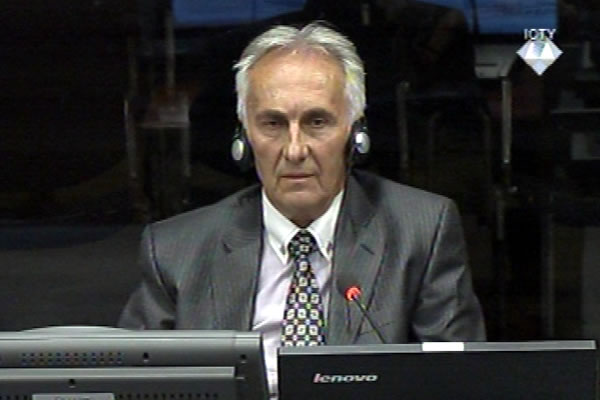Home
WHY AND HOW MUSLIMS LEFT PALE
In the cross-examination, the prosecution has put emphasis on the documents which contradict the witness’s claims that the Muslims left Pale of their own accord, in fear of retribution
 Zdravko Cvoro, defence witness at Rako Mladic trial
Zdravko Cvoro, defence witness at Rako Mladic trial Former president of the Pale Executive Board Zdravko Cvoro claimed in the examination-in-chief at the trial of Ratko Mladic that the Muslims left that municipality of their own accord, because they feared retribution for the crimes committed by their compatriots against Serbs. Cvoro said in his evidence that despite ‘active efforts’ of the Serb authorities to ‘persuade’ them to stay, Muslims finally submitted their ‘applications for a change of residence’. Eventually, the Serb authorities ‘granted their applications’.
Prosecutor Arthur Traldi noted in the cross-examination that until the war there were 4,364 Muslims living in Pale municipality, 27 per cent of the total population. The prosecution alleges that the Serb authorities expelled most of those Muslims to Sarajevo in late June and early July 1992. They left in convoys under police escort. The prosecutor corroborated the claim with a series of documents that contradicted the witness’s claims about voluntary departure. The judges also took note of this discrepancy.
The prosecutor also presented documents that relate to the drive to arm the Serbs in Pale in the spring of 1992, to the establishment of the municipal Crisis Staff, which comprised only Serbs, and to a group of 400 Muslims who were arrested and abused in Bratunac. The group was then transferred to Pale and then deported to Visoko. The prosecutor reminded Cvoro about what prosecution witnesses had stated in their evidence: that in the spring of 1992 Nikola Koljevic personally told Muslims they were not wanted in Pale because ‘Serbs no longer want to live with them’.
Cvoro argued that he didn’t know anything about the effort to arm the Serbs in Pale. The fact that there were no Croat and Muslim members in the Crisis Staff was, in Cvoro’s view, ‘a political issue’. After he saw the footage showing prisoners from Bratunac Cvoro said that it ‘might have been staged’. When the judges intervened, Cvoro finally agreed that many prisoners bore evidence of abuse. Cvoro however claimed that they were not ‘prisoners’ but simply ‘people’, because they had not been arrested in Pale. This prompted Judge Orie to present the witness with a hypothetical situation: if a prisoner is transferred through Vienna, he cannot be considered a prisoner for the duration of his stay in Vienna just because he has not been arrested there. Cvoro then changed his mind and agreed that the men 'may have been' prisoners.
The prosecutor also reminded the witness of a letter he wrote to Biljana Plavsic in July 1992, in which he personally told Plavsic about forcible evacuation of Muslims from Pale. Cvoro fell back on the same story he told in his evidence at the trial of Radovan Karadzic. According to him, the Muslims ‘misinterpreted’ the decision passed by the Municipal Assembly on 18 June 1992, which stated that all citizens had the right to live where they wanted to. There were some Serb individuals who also misunderstood the municipal decision. Some of them were police officers, but in Cvoro’s words they were ‘exceptions’.
Zdravko Cvoro will complete his evidence tomorrow. The defense will then call protected witness RM 311 .
Linked Reports
- Case : Mladic
- 2014-06-03 ‘MUSLIM SIDE RESPONSIBLE FOR POWER CUTS IN SARAJEVO’
- 2014-06-02 EVIDENCE ON EVENTS BEFORE AND AFTER PERIOD RELEVANT FOR INDICTMENT
- 2014-05-30 MARKALE 1 COMMISSION: PHANTOM OR REAL?
- 2014-06-05 SEVERED HEADS ALL OVER SARAJEVO
- 2014-06-06 PROSECUTION: ‘WITNESS IS INCONSISTENT AND INCREDIBLE’
- 2014-06-06 ‘HONEST PEOPLE’S CLUB’ AGAINST PARAMILITARY FORMATIONS
